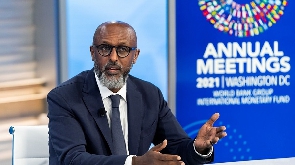 The Director of the Africa Department of the International Monetary Fund, Mr Abebe Aemro Selassie
The Director of the Africa Department of the International Monetary Fund, Mr Abebe Aemro Selassie
The Director of the Africa Department of the International Monetary Fund, Mr Abebe Aemro Selassie, has said the only thing standing in the way of Ghana getting Board approval from the Fund for the US$3 billion extended credit facility is the needed financing assurances from the country's bilateral partners.
Speaking to journalists on the sidelines of the Spring meetings, Mr Selassie said: “We are now comfortable that all of the measures required for us to present the program to our Executive Board are complete, except for the required financing assurances from Ghana’s external creditors.”
The IMF, recently, urged Ghana’s creditors to hasten to grant the financing assurances needed promptly so the Board of the Bretton Woods institution can approve the cocoa-, gold- and oil-producing West African country’s $3-billion extended credit facility to restore economic stability to the nation.
“We're calling on bilateral creditors to support Ghana's effort to restore debt sustainability, form an official creditor committee, and deliver the necessary financing assurances as soon as possible,” the Fund’s communications director Julie Kozack told journalists at a news briefing in Washington DC.
A questioner had asked: “Ghana's president has said he expects the programme request to go to the IMF Board by the end of this month. Is that realistic? Can you give us an update on that?”
Ms Kozack answered: “So, on December 12th, 2022, the IMF reached a staff-level agreement with Ghana on a three-year programme supported by an arrangement under the ECF. This programme was worth about $3 billion.”
“Ghana also requested a debt treatment under the G20 Common Framework,” she noted.
She said: “Financing assurances from partners and creditors are necessary for presenting the programme request to the IMF's Executive Board for approval”, adding: “We continue to engage closely with the Ghanaian authorities while they seek these assurances.”
The IMF programme, Ms Kazack indicated, “aims to support Ghana's efforts to restore macroeconomic stability, debt sustainability while also protecting the vulnerable, preserving financial stability, and laying the foundation for strong and inclusive growth.”
A few weeks ago, President Nana Akufo-Addo said his government is “making progress on the external debt negotiations” with its development partners “since the government announced an external debt service suspension on 19th December 2022 for certain categories of external debt, to ensure an orderly restructuring.”
The suspension, the president told parliament in his state of the nation address on Wednesday, 8 March 2023, “is an interim emergency measure toward a comprehensive external debt operation which will contribute to the restoration of our debt sustainability in line with our request for a debt treatment under the G20 Common Framework.”
“I want to express our appreciation to the members of the Paris Club and to the Peoples’ Republic of China for the cooperation they have, so far, exhibited to us in attempting to reach an agreement, and in their attempt to establish an Official Credit Committee.”
“We look forward to their fast-tracking the needed financing assurances for IMF approval. We are confident that, with their cooperation, we will reach our March deadline for going to the Fund,” he said.
Already, the government has restructured its domestic debt and now seeking to replicate it on the international front in order to clinch an approval for a $3-billion extended credit facility from the Board of the IMF.